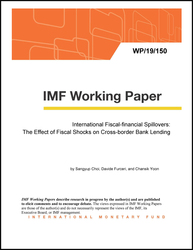
International Fiscal-financial Spillovers: The Effect of Fiscal Shocks on Cross-border Bank Lending
This paper sheds new light on the degree of international fiscal-financial spillovers by investigating the effect of domestic fiscal policies on cross-border bank lending. By estimating the dynamic response of U.S. cross-border bank lending towards the 45 recipient countries to exogenous domestic fiscal shocks (both measured by spending and revenue) between 1990Q1 and 2012Q4, we find that expansionary domestic fiscal shocks lead to a statistically significant increase in cross-border bank lending. The magnitude of the effect is also economically significant: the effect of 1 percent of GDP increase (decrease) in spending (revenue) is comparable to an exogenous decline in the federal funds rate. We also find that fiscal shocks tend to have larger effects during periods of recessions than expansions in the source country, and that the adverse effect of a fiscal consolidation is larger than the positive effect of the same size of a fiscal expansion. In contrast, we do not find systematic and statistically significant differences in the spillover effects across recipient countries depending on their exchange rate regime, although capital controls seem to play some moderating role. The extension of the analysis to a panel of 16 small open economies confirms the finding from the U.S. economy.
Publication date: July 2019
ISBN: 9781484389690
$18.00
Add to Cart by clicking price of the language and format you'd like to purchase
Available Languages and Formats
| English |
Prices in red indicate formats that are not yet available but are forthcoming.
Topics covered in this book
This title contains information about the following subjects.
Click on a subject if you would like to see other titles with the same subjects.
Fiscal-financial spillovers , Cross-border banking flows , Local projections , Nonlinear effects , Trilemma , , recipient country , cross-border , fiscal expansion , Romer , projection method
Summary
Copyright © 2010 - 2025
Powered by:
AIDC



